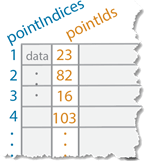removeWorldPoints
Remove world points from world point set
Description
wpSet = removeWorldPoints(wpSet,pointIndices)pointIndices from
the world point set wpSet. Use this syntax if you added points using
the addWorldPoints function without specifying unique point identifiers
pointIds.
wpSet = removeWorldPoints(wpSet,pointIds)pointIDs from the world point
set wpSet. Use this syntax if you added points using the addWorldPoints function by specifying unique point identifiers
pointIds.
